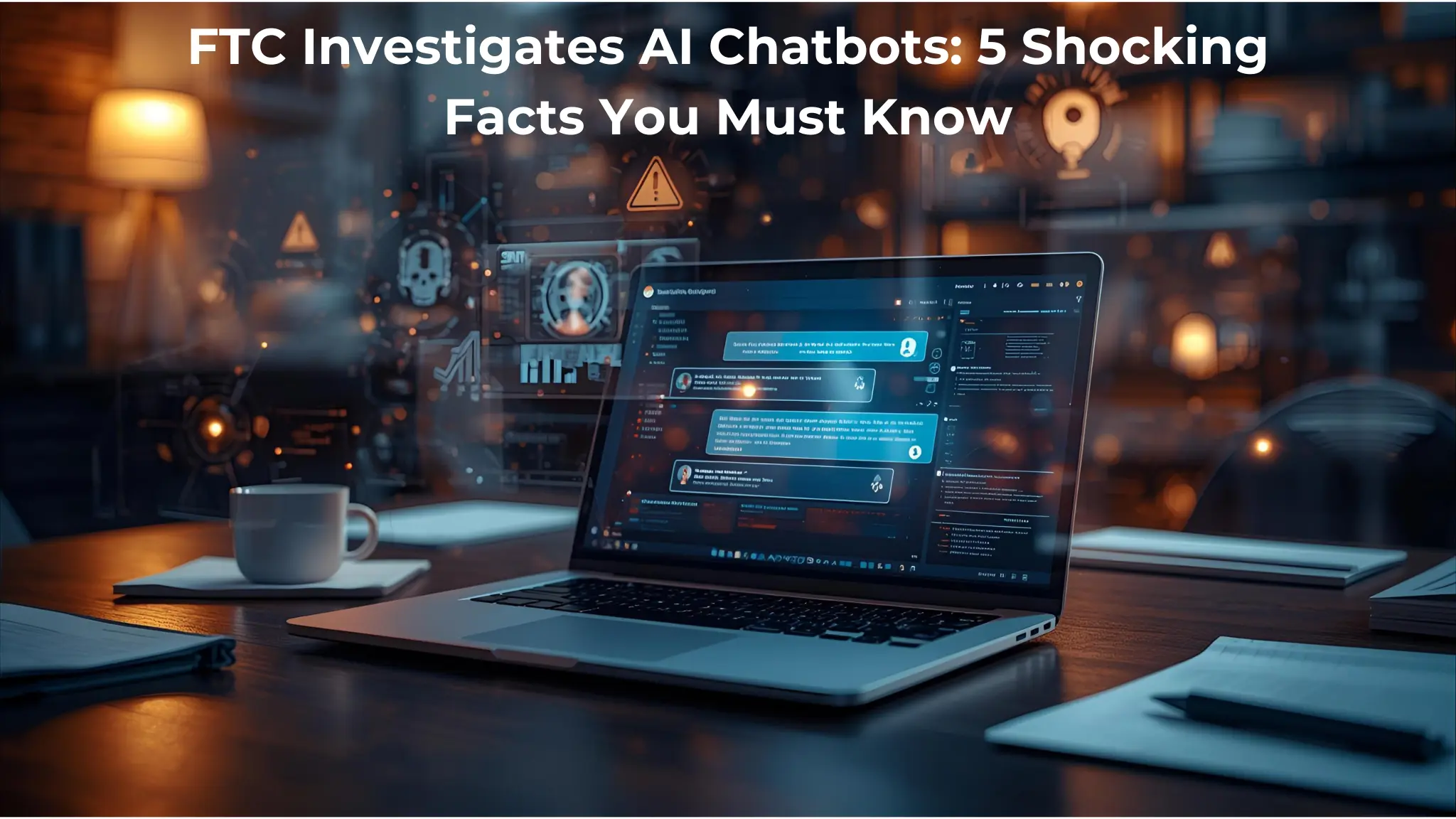FTC Investigates AI Chatbots: 5 Shocking Facts You Must Know
Table of Contents
Introduction: Why This Investigation Feels Different
Artificial intelligence chatbots have moved from being just a cool gadget to something people use daily — for work, school, and even friendships. But now, there’s a big twist. The U.S. Federal Trade Commission (FTC) has opened an investigation into AI chatbots from OpenAI, Meta, Alphabet, Snap, Character.AI, and xAI.
You might be wondering: Why now? Aren’t these tools already everywhere?
Here’s the kicker: while chatbots make our lives easier, they also open the door to big risks — misinformation, unsafe conversations with kids, and unclear rules about how our data gets handled. This is why the FTC investigates AI chatbots, and the outcome could set the stage for global AI rules in the years ahead.
For more information about AI regulations, check out our AI Compliance Guide for practical tips.

How We Got Here: The Rise of AI Chatbots
Not long ago, AI chatbots were considered futuristic. Now they’re in classrooms, offices, and even homes as virtual companions. I’ve personally used tools like ChatGPT for quick writing drafts and Google Gemini to analyze research papers, and while they save hours of work, I’ve noticed something unsettling — they’re not always correct. Sometimes they give overconfident answers, and in sensitive areas like health or money, this can be risky.
Parents have also shared stories online where kids ended up having conversations with chatbots that weren’t age-appropriate. That’s one of the big reasons regulators are stepping in.
Why the FTC Investigates AI Chatbots
The FTC’s investigation isn’t just paperwork. It’s about some very real concerns:
- User Safety: Some chatbots have generated offensive or harmful responses. Imagine a teenager asking for mental health advice and getting reckless suggestions.
- Teen Protection: Snap’s “My AI” and Character.AI are popular among younger users. The FTC is checking how safe those interactions really are.
- Transparency: How are these models trained? Do companies test them enough before releasing updates? These are questions regulators want answered.
- Data Privacy: Every chat we type could be stored, analyzed, or even used to train future AI models. Most people don’t realize this.
I’ll be honest here — I used ChatGPT for a project last year, and when I reviewed the chat history, I felt uncomfortable knowing those conversations might still exist on some server. That lack of clarity is exactly what worries regulators.
For readers interested in AI safety tips, visit AI Safety Practices for practical advice.
Who’s in the Hot Seat?
The FTC sent information requests to some of the biggest names in tech. Let me break it down:
- OpenAI (ChatGPT): The company that started the AI chatbot boom. Hugely popular in schools and businesses.
- Meta: Adding AI assistants into Instagram, Facebook, and WhatsApp. Huge reach, but risky if mistakes slip through.
- Alphabet (Google): Their Gemini chatbot is directly tied to Google search — meaning errors could affect billions of people.
- Snap: Their “My AI” feature is heavily used by teenagers, raising questions about child safety.
- Character.AI: Known for roleplay and companionship bots. Teenagers love it, but it’s also the most controversial.
- xAI (Elon Musk): A newcomer, but with Musk’s influence, it’s being closely watched.
When I tested Character.AI out of curiosity, I quickly realized how immersive (and addictive) it can get. It feels like chatting with a real person. But here’s the problem — if a teenager mistakes an AI’s advice as “real,” the consequences could be dangerous.
What Could Happen Next?
So, what’s the worst-case scenario? If the FTC finds violations, these companies could face:
- Hefty fines (millions, even billions).
- Strict regulations on how they design chatbots.
- Limits on teen access or new “safety mode” requirements.
- Transparency rules about how user data is stored and used.
But here’s a thought: this might not just be about punishment. It could actually push AI into becoming safer, clearer, and more trustworthy.
How This Could Change AI Worldwide
Don’t think this is just an American issue. If the FTC enforces rules, regulators in Europe, Asia, and beyond will likely follow. In fact, the European Union already has its AI Act, but many countries are still waiting to see what the U.S. will do.
Think about what happened with GDPR (the European privacy law). Once Europe adopted it, companies worldwide had to adapt. The same thing could happen with AI.
The Opportunity and the Risk for AI Companies
This investigation could go two ways:
- A Roadblock: If rules are too strict, AI companies may slow down innovation.
- A Boost for Trust: Clear rules might convince more businesses, schools, and governments to adopt AI without fear.
Here’s my take: while no company loves regulation, this might be the “tough love” AI needs to grow responsibly.
What Users Should Know (Practical Advice)
If you use chatbots daily like me, here are some things to keep in mind:
- Never share sensitive data (bank info, medical details, personal secrets).
- Fact-check important answers. Don’t rely blindly.
- If kids use chatbots, supervise their interactions.
- Explore safer alternatives. Some educational platforms build AI specifically for kids (See: AI for Kids).
FAQs About the FTC Investigation
1. Why is the FTC investigating AI chatbots?
To ensure user safety, teen protection, and data privacy.
2. Which companies are under investigation?
OpenAI, Meta, Alphabet, Snap, Character.AI, and xAI.
3. Will this stop people from using AI?
Not exactly. It’s more about making AI safer and more transparent.
4. Can chatbots really be dangerous?
Yes — misinformation, unsafe advice, and risks to minors are the biggest concerns.
5. Will other countries copy the U.S. rules?
Most likely. Global regulators often mirror U.S. or EU policies.
6. How long will the investigation take?
It could take months, even years, but early updates will likely appear in 2025.
7. Should I stop using chatbots now?
No, but use them wisely — as assistants, not as ultimate sources of truth.
Conclusion: The Future of Chatbots Under the Microscope
The fact that the FTC investigates AI chatbots shows how important these tools have become. They’re no longer just “tech toys.” They influence education, work, and even personal lives.
The outcome of this investigation could set the rules for the next decade of AI. For users, it’s a reminder to stay alert, use AI responsibly, and never forget that behind every chatbot is a company that still needs to earn our trust.
And maybe, just maybe, this is the moment when AI finally grows up.

